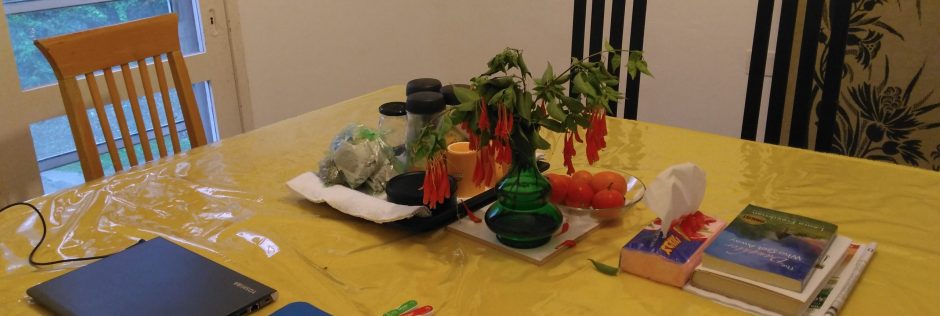 Debby was not a “soft” person, but she was not bitter, either. Her mother had died in 1912 when Debby was a baby, and her fairy-tale stepmother, whom she and her brother referred to as “Horse-face,” beat her and forced her to iron clothing three to four hours a day. Her father was a charismatic “ne’er-do-well” who could always get the best herring by mimicking the regional Yiddish of any shopkeeper. During this time, he was out pursuing other women.
Debby was not a “soft” person, but she was not bitter, either. Her mother had died in 1912 when Debby was a baby, and her fairy-tale stepmother, whom she and her brother referred to as “Horse-face,” beat her and forced her to iron clothing three to four hours a day. Her father was a charismatic “ne’er-do-well” who could always get the best herring by mimicking the regional Yiddish of any shopkeeper. During this time, he was out pursuing other women.
Debby’s biological mother was a Charlop, descended from King David and the Exilarchs of Babylonia, and Debby was tall, with unusually deep-set brown eyes. The relatives she was later sent to live with considered her an attractive addition to their households and taught her to weave Yiddish into her conversation. She often said, “I’m good at living in other people’s houses.” Her older brother Morris became a successful dentist and wanted Debby to go to university, but she went to a business college instead and fell in love with Herman Goodman, a traveling hardware salesman.
After Debby felt ill for several weeks without realizing she was pregnant, Herman was called into the office of Debby’s doctor, a forthright woman who campaigned with Margaret Sanger for women’s access to birth control. This doctor ordered Herman to marry Debby. Yet neither Herman nor Debby ever regretted the marriage, and they made a good team. During the Great Depression his salary dropped from $200 a week to $20; she wore, without complaint, cotton housedresses that cost $1 each. He continued his sales rounds in the New York winter even though he didn’t own a coat, telling his family he was warm enough in his sweater.
In the 1940’s Herman went into business for himself as a wholesale hardware concern, travelling the Eastern and Midwestern states and putting 100,000 miles a year on a succession of Packards. To make his life easier, Debby decided they should publish a mail-order catalogue—an innovation in that era. Unlike Debby, Herman was “soft” or sensitive, so she wove her suggestion into a discussion in such a way that he was always convinced the catalogue was his own brilliant idea.
Herman Goodman & Company occupied a large loft on Chambers Street in lower Manhattan. At the front were two desks, but the rest of the loft had floor-to-ceiling shelves holding boxes of hammers, screwdrivers, hoses, files, drills, drill bits, clamps, and many other items. Debby’s innovation, the mail-order catalogue, meant that no one had to travel or meet clients in person. To create the catalogue, she sat for hours rubber-cementing tiny pictures of drills and saws, along with their specifications, looking down at the page through the half-glasses she wore on a necklace. Cuttings would be spread over the desk, and her self-imposed deadlines were sacred and pressing.
Debby also had a gift for getting along with people, which was good for business. After Herman died of a heart attack, she managed Herman Goodman & Company alone. She’d talk on the telephone to the owners of midwestern hardware stores and tell them that Herman was away on a trip, never revealing that Herman was dead and the business was run by a woman. Occasionally a travelling salesman appeared unexpectedly at the door of the loft on Chambers Street, and she’d say that Herman was out at a meeting. The salesmen joked with her and gave her samples for her grandchildren: a pen that wrote in twelve different colors, or keychains with dangling compasses.
Debby never retired, as she wanted to continue the business that she and Herman had started. She did not re-marry, but instead worked full time and spent her leisure hours with her friend Marion, who had also lost her husband. She and Marion went to dinner, theatre, or museums in New York; took cruises in the Caribbean in winter, and traveled together to Europe and Israel. Debby retained her aristocratic beauty and elegance. She and Marion were spoken of as a unit: “Debby and Marion saw a new musical last week,” or “Marion and Debby are in Amsterdam.” At one time, Debby’s close friend Milton, whose wife had been killed in a car accident, proposed that she marry him. The proposal was giggled over by Debby and Marion, discussed seriously, but ultimately refused. Debby said that no one could replace Herman Goodman.
Copyright © Leora Freedman 2015
***If you have something to say, or a story to share, our comments page is the place to leave it!
 Copyright secured by Digiprove © 2015 Leora Freedman
Copyright secured by Digiprove © 2015 Leora Freedman
 An article about both my forthcoming book and its publisher just appeared in the Edmonton Jewish News.
An article about both my forthcoming book and its publisher just appeared in the Edmonton Jewish News.

 This is a story that’s embedded in my forthcoming novel, The Daughter Who Got Away. The novel will be published in March 2016 and can be pre-ordered from Amazon. Please forward this link to someone you know!
This is a story that’s embedded in my forthcoming novel, The Daughter Who Got Away. The novel will be published in March 2016 and can be pre-ordered from Amazon. Please forward this link to someone you know!
 Menachem Goodman was descended from a long line of rabbis whose dearest goal was a personal and spiritual perfection they knew they would never reach. From the day of Menachem’s birth, his family planned that he too would become a rabbi, immersed in religious scholarship, ethical debates, and spiritual growth. But when Menachem was a young man in 1890, the “enlightenment” was overturning tradition in the Jewish villages of Eastern Europe. It was exhilarating to be freed from the obligation to attend meticulously to the religious commandments. Menachem also loved to read secular books, and he decided that becoming a rabbi was not in his essential nature.
Menachem Goodman was descended from a long line of rabbis whose dearest goal was a personal and spiritual perfection they knew they would never reach. From the day of Menachem’s birth, his family planned that he too would become a rabbi, immersed in religious scholarship, ethical debates, and spiritual growth. But when Menachem was a young man in 1890, the “enlightenment” was overturning tradition in the Jewish villages of Eastern Europe. It was exhilarating to be freed from the obligation to attend meticulously to the religious commandments. Menachem also loved to read secular books, and he decided that becoming a rabbi was not in his essential nature. Debby was not a “soft” person, but she was not bitter, either. Her mother had died in 1912 when Debby was a baby, and her fairy-tale stepmother, whom she and her brother referred to as “Horse-face,” beat her and forced her to iron clothing three to four hours a day. Her father was a charismatic “ne’er-do-well” who could always get the best herring by mimicking the regional Yiddish of any shopkeeper. During this time, he was out pursuing other women.
Debby was not a “soft” person, but she was not bitter, either. Her mother had died in 1912 when Debby was a baby, and her fairy-tale stepmother, whom she and her brother referred to as “Horse-face,” beat her and forced her to iron clothing three to four hours a day. Her father was a charismatic “ne’er-do-well” who could always get the best herring by mimicking the regional Yiddish of any shopkeeper. During this time, he was out pursuing other women. Yedidja and his siblings grew up in Jerusalem in the 1920’s and 30’s, speaking Ladino at home, Arabic in the market, English at school, and Hebrew in the synagogue. Closest to their hearts was Ladino, the language of the Jews exiled from Spain, but their own children grew up speaking Hebrew in the new state of Israel. Ladino became a medium in which the older folks relived warm memories and talked of intimate things not meant for children. Sometimes they still sang the Ladino romances, like “Open Your Closed Door.”
Yedidja and his siblings grew up in Jerusalem in the 1920’s and 30’s, speaking Ladino at home, Arabic in the market, English at school, and Hebrew in the synagogue. Closest to their hearts was Ladino, the language of the Jews exiled from Spain, but their own children grew up speaking Hebrew in the new state of Israel. Ladino became a medium in which the older folks relived warm memories and talked of intimate things not meant for children. Sometimes they still sang the Ladino romances, like “Open Your Closed Door.” In the late 1920’s Flora got her first teaching job at a Sunday Hebrew school for Jewish children in New York. Since the children were poor the education was almost free, though each child had to pay a nickel per week. The school administration thought that the families wouldn’t value the education if they didn’t pay something for it.
In the late 1920’s Flora got her first teaching job at a Sunday Hebrew school for Jewish children in New York. Since the children were poor the education was almost free, though each child had to pay a nickel per week. The school administration thought that the families wouldn’t value the education if they didn’t pay something for it. Flora’s friend Yedidja grew up as an eighth-generation Jerusalemite in a Sephardic family that spoke Ladino at home. His family had frequent get-togethers which lasted long into the night, and the children were allowed to stay up as late as they wanted. Yedidja remembered falling asleep on cushions in a corner of the room while the adults told stories and sang one Ladino romance after another. These romances were the beautiful ballads of the Jews who were exiled from Spain; songs of both earthly and spiritual love and longing.
Flora’s friend Yedidja grew up as an eighth-generation Jerusalemite in a Sephardic family that spoke Ladino at home. His family had frequent get-togethers which lasted long into the night, and the children were allowed to stay up as late as they wanted. Yedidja remembered falling asleep on cushions in a corner of the room while the adults told stories and sang one Ladino romance after another. These romances were the beautiful ballads of the Jews who were exiled from Spain; songs of both earthly and spiritual love and longing. Back in the 1920’s, Joseph and Charlotte Baum and their friends loved practical jokes. Once, as a new bride, Charlotte was sent a picture postcard, forwarded from a friend of theirs who had supposedly received it from Charlotte’s new husband Joseph. The picture showed Joseph sitting in a rowboat with a young woman in a sequinned flapper dress and a tight hat with a big artificial rose. Their friend sent this picture to Charlotte enclosed in a letter saying how sorry he was to break this news. On the back of the card, Joseph had written a warning not to show it to Charlotte. Their friend wrote that he felt it was only right to inform her. Charlotte found all of this hilarious and kept the card for the rest of her life
Back in the 1920’s, Joseph and Charlotte Baum and their friends loved practical jokes. Once, as a new bride, Charlotte was sent a picture postcard, forwarded from a friend of theirs who had supposedly received it from Charlotte’s new husband Joseph. The picture showed Joseph sitting in a rowboat with a young woman in a sequinned flapper dress and a tight hat with a big artificial rose. Their friend sent this picture to Charlotte enclosed in a letter saying how sorry he was to break this news. On the back of the card, Joseph had written a warning not to show it to Charlotte. Their friend wrote that he felt it was only right to inform her. Charlotte found all of this hilarious and kept the card for the rest of her life
 In many Jewish homes of that era, there were no pets. Animals in the home were just not the done thing in America, though ancestors in Eastern Europe had kept cows, chickens, and goats—for food, not for pleasure. In New York, Flora and Morris Feuerstein were an anomaly with their succession of German shepherds (long before this dog had Nazi associations). But they didn’t trust the German shepherds with children, so they started adopting unwanted pets brought to them by a veterinarian friend.
In many Jewish homes of that era, there were no pets. Animals in the home were just not the done thing in America, though ancestors in Eastern Europe had kept cows, chickens, and goats—for food, not for pleasure. In New York, Flora and Morris Feuerstein were an anomaly with their succession of German shepherds (long before this dog had Nazi associations). But they didn’t trust the German shepherds with children, so they started adopting unwanted pets brought to them by a veterinarian friend.